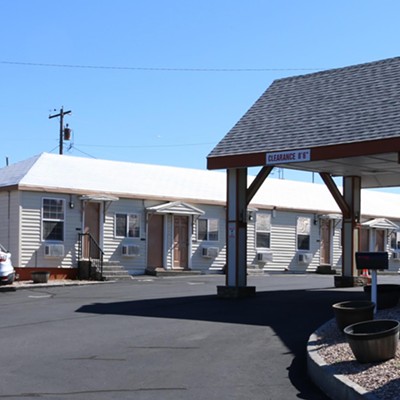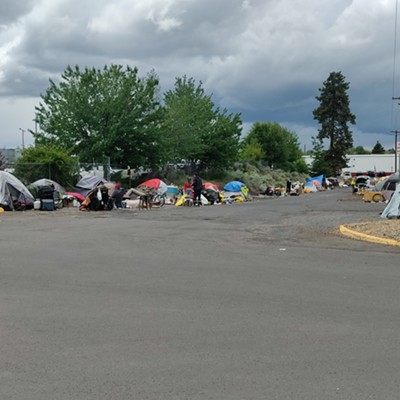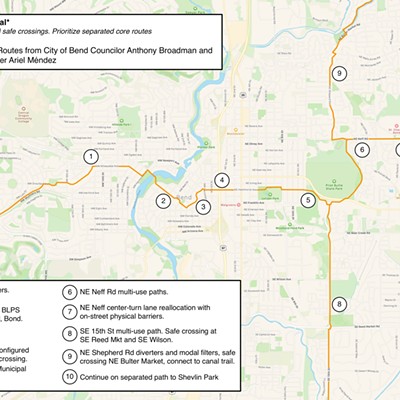Driving across Bend is a little like playing Minesweeper, only the potholes don't explode. So it's not surprising that, in a recent survey by DHM Research, 61 percent of respondents described road conditions in Bend as "poor" or "very poor."
And data backs up that gut feeling. Because road damage has outpaced funding for repairs, Bend roads currently have a Pavement Condition Index (PCI) of 68, aka "poor." PCI is a method of measurement developed by the Army Corps of Engineers.
And, unless something changes, it will only get worse.
"Continuing with the current funding, the PCI will drop by 1 every year and allow the roads to get so bad that repairs will require extremely expensive rebuilds," explains Mayor Jim Clinton. "Preventing this further degradation will cost $2.5 million per year. $5 million per year will provide sufficient street maintenance to increase PCI by 1 each year so that after five years the roads will be in the mid-70s heading towards 'good.'"
A 5 cent per gallon tax is estimated to generate $2.5 million a year, while a 10 cent per gallon tax is expected to raise twice that. Clinton says he favors the latter to get roads up to "good" condition sooner.
"No tax has a better connection between the users of the roads and the money needed to maintain the pavement," Clinton says. "There are no good arguments against a fuel tax to fund road maintenance."
Still, not everyone is on board. Some argue that the City should re-evaluate its funding priorities before putting a new tax on the ballot.
Bend attorney and former mayor Jeff Eager says he is representing a group of seven local fuel business owners who oppose the tax and argue that the City's budget is growing enough to cover the cost of road improvements and that the tax would harm business by discouraging in-town fuel sales and increasing costs for companies that buy fuel in Bend.
He says that funding for street preservation has gone down even as the City's overall budget has gone up.
"The City has budgeted to spend only $1.8 million per year over the next two years on street preservation," Eager says. "It will receive $4.5 million per year in state gas tax. It will receive an additional $4.5 million per year in general fund revenue over the last budget period. If the City treats street preservation as a budget priority, it does not need to raise taxes."
City Manager Eric King clarified those numbers, explaining that $1.8 million represents only a portion of the City's $3.5 million budget for street preservation in 2015/2016, specifically the amount dedicated to fully repaving roadways.
Still, local residents, despite their support for a gas tax, echoed that desire to find more street funding in existing coffers, with 54 percent of those surveyed by DHM saying they believe the City has enough money to cover the costs.
But Mayor Clinton reiterates that's not the case, and says Council has been looking into options for funding road improvements for years.
"The only way to extract the needed funding from the current revenues is to cut police and or fire, including layoffs. I am not going to do that," Clinton says. "The Council has considered a transportation utility fee [TUF], which is a charge on all water and sewer bills, and squeezing more money out of the General Fund, the vast majority of which goes to police and fire. We have been squeezing for many years, but the needed money has not been found. I would consider a TUF for sidewalks, but not for road maintenance."
The DHM survey also asked about a transportation utility fee, but it was the least popular funding option of those presented. A gas tax tied with a studded tire fee as most popular, with each selected as the top pick by 29 percent of those surveyed. By comparison, a utility fee got just 5 percent support.
Bend 2030 is working to bring together the disparate perspectives and has suggested that any potential vote on a gas tax wait until the City crafts a more complete funding plan.
"[We have] worked closely with the Bend Chamber of Commerce, Jeff Eager in his role representing several petroleum companies, The Environmental Center, Commute Options, and the City of Bend to consider whether some sort of compromise package could be nailed down by August 5, when the Council will likely make a decision about putting a gas tax on the November ballot," explains Bend 2030 Executive Director Erin Foote-Marlowe. But she doesn't think it's a realistic time frame to consider all the elements of a comprehensive transportation funding plan.
"Bend 2030 believes that a gas tax needs to be just one piece of a comprehensive funding solution to our transportation issues. Other options include pulling revenue from the general fund, a transportation utility fee and even a bike registration fee. How much could we earn from these other revenue streams? What is the fairest way to spread the burden of paying for improvements to the transportation system? How will those other revenues impact the rate of a gas tax?" she asks. "We believe we need to do the homework of answering all these questions before we ask the voters to approve a tax."
If Council does not move forward with a gas tax on the November ballot, it could instead aim for a March special election.



























